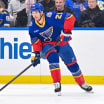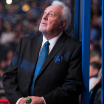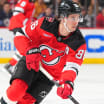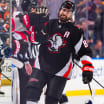NHL.com is providing in-depth analysis for each of its 30 teams throughout August. Today, the biggest reasons for optimism and the biggest questions facing the Ottawa Senators:
The Ottawa Senators made sweeping changes in the front office, behind the bench and on the ice after missing the Stanley Cup Playoffs for the second time in three seasons.
Reasons for optimism, questions facing Senators
Coach Guy Boucher's plans for power play should improve unit; better starts needed
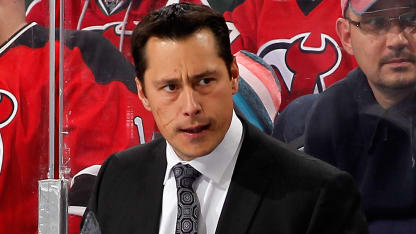
© Andy Marlin/Getty Images
By
Chris Stevenson / NHL.com Correspondent
After Bryan Murray stepped down as general manager to focus on his fight with colon cancer and spend time with his family, assistant general manager Pierre Dorion took over and promptly made a coaching change, firing Dave Cameron and hiring Guy Boucher.
The Senators were ninth in the NHL in goals per game last season at 2.80, and Boucher's task is clear: Improve a defense that last season allowed the fifth-most goals (2.94 per game) and the most shots per game (32.8), and special teams units that ranked in the bottom five in the League (power play (15.8 percent, 26th) and penalty killing (75.8 percent, 29th)).
Here are four reasons for optimism entering this season:
1. Guy Boucher is a power-play specialist
The Senators were tied for last in the League with 38 power-play goals and were even worse at home; their 15 power-play goals at Canadian Tire Centre were five fewer than any team scored at home. Boucher earned a reputation as a power-play specialist with Canada at the 2009 IIHF World Junior Championship, where he was an assistant coach to Pat Quinn and ran Canada's power play which went 21-for-42 on its way to winning its fifth gold medal in a row.
The next season, Boucher coached Hamilton of the American Hockey League and it finished sixth in the AHL with 70 power-play goals (13th in efficiency at 17.6 percent) on their way to winning the North Division. Boucher was named AHL coach of the year.
In 2010-11, his first season as coach of the Tampa Bay Lightning, their power play was sixth (20.5 percent) but tumbled to 24th (15.2 percent) the next season.
If the Senators are going to meet their goal of making the playoffs, an improved power play is going to be an important ingredient.
Senators 30 in 30: Season outlook | Top prospects | Fantasy outlook
2. Guy Boucher's history with forward Mike Hoffman
Boucher and Hoffman have expressed enthusiasm about being reunited with the Senators. Hoffman played for Boucher for two seasons (2007-09) with Drummondville of the Quebec Major Junior Hockey League, and they won the league championship in 2008-09.
Hoffman, who agreed to terms on a four-year, $20.75 million contract July 26, led the Senators with 29 goals last season, including nine on the power play ranking sixth in power-play ice time per game among Senators forwards.
Boucher said he intends to make Hoffman a featured player on the power play.
3. Center Kyle Turris, left wing Clarke MacArthur are healthy
The Senators missed two-thirds of their top line for much of last season. MacArthur missed all but the first four games because of a concussion sustained Oct. 14, and Turris was limited to 57 games because of an ankle sprain.
With the veterans back in the lineup, the top nine forwards are considerably deeper and should help at both ends of the ice.
4. Defenseman Erik Karlsson is in his prime
The two-time Norris Trophy winner as the League's top defenseman is coming off his best offensive season with a Senators-best 82 points, and at age 26 better seasons might be ahead of him.
He joined Hockey Hall of Famer Denis Potvin as the only defenseman to lead his team in scoring three seasons in a row (Potvin did it four times with the New York Islanders, from 1973-74 to 1976-77).
Karlsson also might benefit from a full season with defenseman Dion Phaneuf, who joined the Senators in a trade with the Toronto Maple Leafs on Feb. 9. Phaneuf is another veteran voice who can support Karlsson in his role as captain.
Here are three key questions facing the Senators:
1. Can the Senators get off to better starts?
The Senators gave up the first goal in 51 games last season and came back to win 14 times (14-30-7). Their 30 regulation losses when allowing the first goal were tied for fourth-most in the League. Their five regulation losses when scoring first were tied for the third fewest.
Whether it was a lack of preparation or waiting to see what type of game the opponent was going to play, the Senators found themselves down more often than not.
Finding a way to score first is going to be a priority if the Senators are going to return to the playoffs.
2. Will Bobby Ryan become a 30-goal scorer again?
Ryan had four 30-goal seasons with the Anaheim Ducks, but in three seasons since being traded to the Senators, he's scored 23, 18 and 22 goals. It will be interesting to see if center Derick Brassard, acquired in a trade with the New York Rangers for center Mika Zibanejad on July 18, can spark Ryan. Zibanejad was Ryan's regular center with the Senators.
It's expected MacArthur and Turris will play with Mark Stone on the first line, leaving Ryan potentially to line up with Brassard, who's coming off a season when he scored an NHL career high 27 goals. Will there be chemistry between Brassard and Ryan?
3. Will the Senators improve enough to make the playoffs?
That question will be answered by the ability of Boucher and his staff to address the obvious weaknesses in the defensive zone and improve the special teams.
With MacArthur and Turris back and adding the experience of Brassard, a full season with Phaneuf and forward Chris Kelly, who signed a one-year contract July 7, the Senators will be a more veteran team. That should lead to more composure, which should translate into steadier play on the defensive end.
Boucher has a reputation as a power-play specialist and the Senators need to improve in that area, but the real concern is defensive-zone play and puck possession (minus-370 SAT, 25th in the League).
If Boucher can address those issues, the Senators should score enough to get back into the playoffs.



